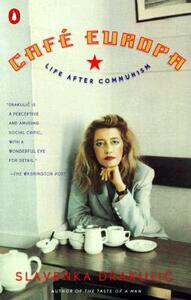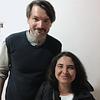Take a photo of a barcode or cover
Cafe Europa is the non fiction account of what life is life in the old communist countries of Yugoslavia, The Czech Republic and others in the Balkin states. It's told as sheer commentary from the point of view of one lady, born in 1949 in Croatia, right after the war, married to an Swede, and living in Austria. Her point of view is naturally very subjective to her experience - and - this book was written in 1996 - which makes it very dated in the year 2009, as the explosion of internet technology has changed even the most remote parts of the world.
Having said that, and having lived through 3 years of communist government in South America - so much of what she wrote about rang true, poor dental health, the desire to be European or American, yet taking immense pride in one's own flawed country, trying to smuggle things like blue jeans and nail polish into the country, buying cheap things on sale even when you can afford better quality - so many of these idiosyncracies are shared with her experience, that the book was worth it for that reason.
On the negative side, I wish there had been a map included, I wish that there had been a brief refresher course on the recent history of that area, because as she dropped political names and countries and cities, they all rang familiar, but I couldn't quite place each one in context. I also felt that there was very little positive to be said of her part of the world - the fleecing of tourists, the unsmiling shopkeepers, the harsh customs agents, the unhappy people - the whole thing was a bit hopeless and seemed to be written in anger, as though after a particularly bad day she had come home to write an essay in her diary and therefore felt better about things. The coffee was bad, the pastries nothing like what was served in Austria, the items for sale were cheaply constructed and overpriced and on and on and on. Not even her father had redeeming features. In that sense her writing somewhat reflects the countries she is trying to describe.
Having said that, and having lived through 3 years of communist government in South America - so much of what she wrote about rang true, poor dental health, the desire to be European or American, yet taking immense pride in one's own flawed country, trying to smuggle things like blue jeans and nail polish into the country, buying cheap things on sale even when you can afford better quality - so many of these idiosyncracies are shared with her experience, that the book was worth it for that reason.
On the negative side, I wish there had been a map included, I wish that there had been a brief refresher course on the recent history of that area, because as she dropped political names and countries and cities, they all rang familiar, but I couldn't quite place each one in context. I also felt that there was very little positive to be said of her part of the world - the fleecing of tourists, the unsmiling shopkeepers, the harsh customs agents, the unhappy people - the whole thing was a bit hopeless and seemed to be written in anger, as though after a particularly bad day she had come home to write an essay in her diary and therefore felt better about things. The coffee was bad, the pastries nothing like what was served in Austria, the items for sale were cheaply constructed and overpriced and on and on and on. Not even her father had redeeming features. In that sense her writing somewhat reflects the countries she is trying to describe.
challenging
informative
medium-paced
Reading this collection of reportage, reflections, and commentaries of someone who had lived in a communist country which, after 1990, opted for democracy --- and war ---- put me on the road to Memory Lane.
The euphoria of 1989 which culminated in the fall of the Berlin Wall and celebrations from Prague, to Warsaw, and (belatedly) to Bucharest, Sofia, and Tirana as the Eastern Bloc collapsed. Yugoslavia (the author's former country) was a slightly different case. In 1990 and 1991, it more or less imploded like a deflated blimp which once stood solidly in the firmanent. (My memories of those times remain ever so vivid. The almost bloodless birth of Slovenia in June 1991, Germany's recognition of Croatia as an independent state, the protracted war of 1991-92 between Serbia and Croatia, and the Bosnian War of 1992-95.)
Throughout the book, Drakulić points out the odd and confusing ways democracy has been practiced both in her native Balkans and in Eastern Europe in the first post-Communist decade. She also provides some interesting insights into her own consumer habits and those like her who had grown up and lived under Communism. (Yugoslavia was a unique Communist country in that it, under Tito, had broken away from the Soviet yoke in 1948, and by the 1960s and 1970s, had a standard of living that was the envy of the Soviet bloc. What's more: Yugoslavs were free to travel abroad.)
Drakulić also is unafraid to look into the fear and reluctance of many people in the Balkans and Eastern Europe to reflect upon and re-examine their respective histories. For even today, many of the post-Communist nations in those areas, as a way of bolstering their legitmacy, use portions of their historical record and memory to reinforce their sovereignty. The best value in reading this book is that it showed me how people like Drakulić (herself married to a Swede) and others like her see themselves in relation to their respective countries and to Europe.
The euphoria of 1989 which culminated in the fall of the Berlin Wall and celebrations from Prague, to Warsaw, and (belatedly) to Bucharest, Sofia, and Tirana as the Eastern Bloc collapsed. Yugoslavia (the author's former country) was a slightly different case. In 1990 and 1991, it more or less imploded like a deflated blimp which once stood solidly in the firmanent. (My memories of those times remain ever so vivid. The almost bloodless birth of Slovenia in June 1991, Germany's recognition of Croatia as an independent state, the protracted war of 1991-92 between Serbia and Croatia, and the Bosnian War of 1992-95.)
Throughout the book, Drakulić points out the odd and confusing ways democracy has been practiced both in her native Balkans and in Eastern Europe in the first post-Communist decade. She also provides some interesting insights into her own consumer habits and those like her who had grown up and lived under Communism. (Yugoslavia was a unique Communist country in that it, under Tito, had broken away from the Soviet yoke in 1948, and by the 1960s and 1970s, had a standard of living that was the envy of the Soviet bloc. What's more: Yugoslavs were free to travel abroad.)
Drakulić also is unafraid to look into the fear and reluctance of many people in the Balkans and Eastern Europe to reflect upon and re-examine their respective histories. For even today, many of the post-Communist nations in those areas, as a way of bolstering their legitmacy, use portions of their historical record and memory to reinforce their sovereignty. The best value in reading this book is that it showed me how people like Drakulić (herself married to a Swede) and others like her see themselves in relation to their respective countries and to Europe.
Although dated now, this collection of personal experiences and stories, frozen in the early 90s gives an honest and interesting insight into the transition stage of Eastern Europe. It highlights the problems of new found democracy and consumerism, whose ideology are in sharp contrast to communism and as a result the citizens don't quite know how to react, stuck between hope for the future and nostalgia for the security of the past.
The struggle to reconcile the past and the present, the desire of each new regime to eradicate all traces of the previous ones and the struggle to find identity are beautifully highlighted.
It would be very interesting to hear the authors thoughts on the situation now. Having visited many of the mentioned countries and cities, I can see the progress made, yet still there are ghosts of the past.
The struggle to reconcile the past and the present, the desire of each new regime to eradicate all traces of the previous ones and the struggle to find identity are beautifully highlighted.
It would be very interesting to hear the authors thoughts on the situation now. Having visited many of the mentioned countries and cities, I can see the progress made, yet still there are ghosts of the past.
challenging
emotional
reflective
slow-paced
A book to accompany my trip to Croatia. It was written in the 90s and is a detailed snapshot of the tangible and psychological reality of that time in former Yugoslavian countries as well as broader Europe. Each bite-sized fragment was too short for me, but I believe it is a collection of newspaper articles at the time which explains it. I would be really fascinated to read a similar collection from Drakulic in the present time, to see her perspective on how it has all ended up now.
The wide-ranging subject matter confronts hard parts of history and one of her main messages is that we must confront history, not whitewash it and forget about the awful parts.
Looking forward to reading more of her work.
The wide-ranging subject matter confronts hard parts of history and one of her main messages is that we must confront history, not whitewash it and forget about the awful parts.
Looking forward to reading more of her work.
I quite enjoyed this collection of short essays, particularly those in which the author writes about her own experiences and memories about growing up in Communist Yugoslavia and how things were different in Yugoslavia than they were elsewhere in 'Eastern' Europe, and what coming from the former Yugoslavia means to her living in the West. I was however somewhat disappointed with how "Western" her opinions and views sounded at times (particularly when she brings up the whole idea of the 'children of postcommunism' in reference to the countries of the area and how they have to be taught what democracy truly is and so on). Also, at times her explanations feel a bit too simplistic (perhaps because of the length of the essays that didn't allow her to discuss some issues in depth). So while I really liked the book, I think I'd have preferred fewer but longer essays with more nuanced and elaborated explanations.
Interesting essays as a starting point for understanding change in former soviet satellites after the fall of communism




